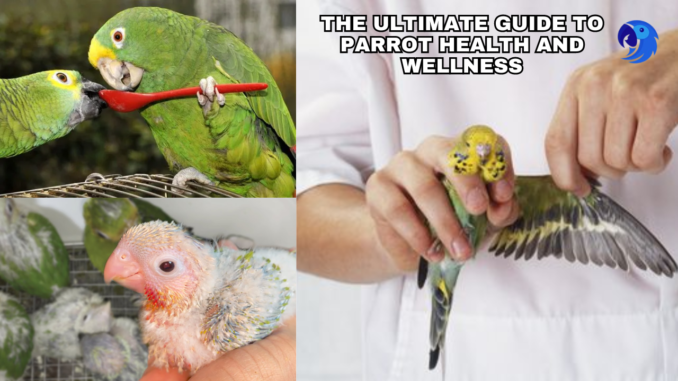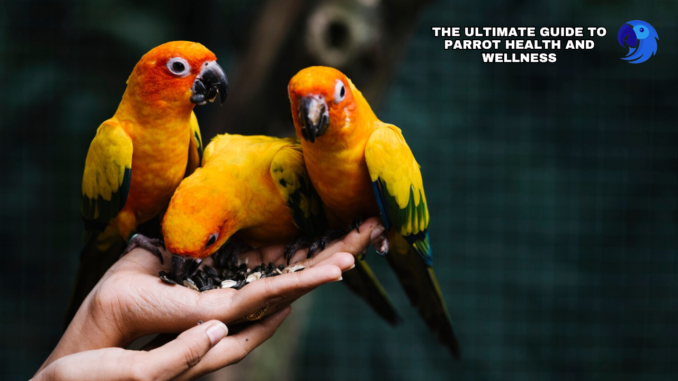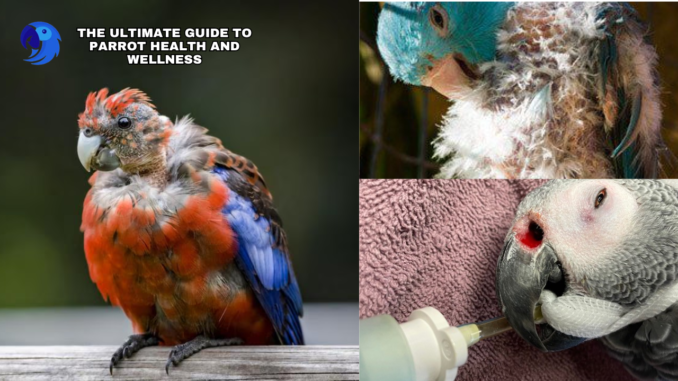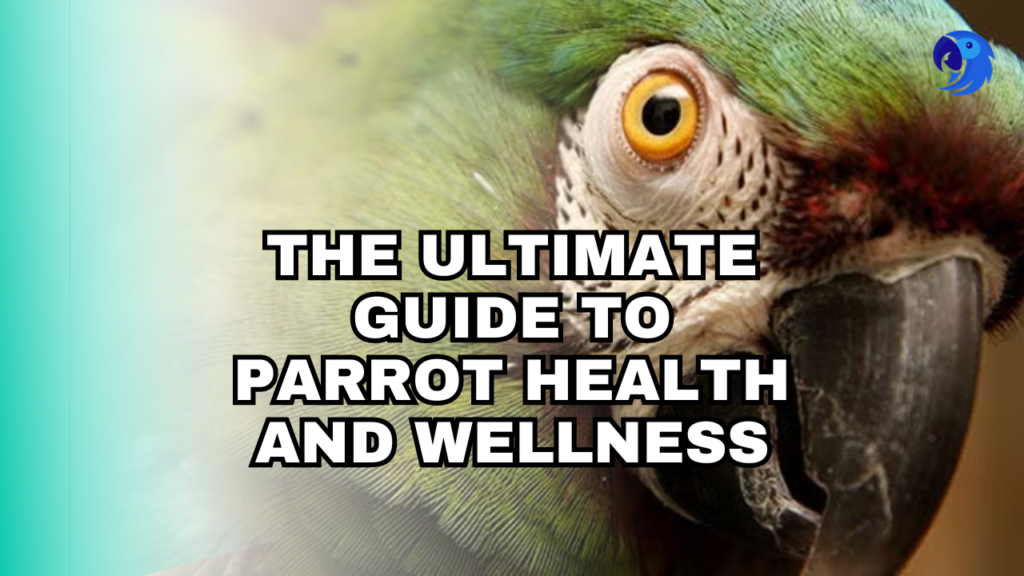Understanding Parrot Health Basics

Common parrot species and their specific health needs
Parrots come in all shapes and sizes, each with their unique health requirements. As a parrot owner, I’ve learned that understanding these differences is crucial. For instance, African Grey parrots are prone to calcium deficiencies, while Amazons often struggle with obesity. Cockatiels, on the other hand, are susceptible to respiratory issues.
When I first brought home my Eclectus parrot, I was surprised to learn about their specialized diet needs. Unlike other parrots, they require a diet high in fruits and vegetables. This experience taught me the importance of researching specific species’ needs.
The importance of preventive care
Preventive care is the cornerstone of parrot health. It’s much easier (and less stressful for both you and your feathered friend) to prevent issues than to treat them. Regular check-ups, a balanced diet, and a clean environment go a long way in keeping your parrot healthy.
I remember when my vet praised me for catching a potential issue early during a routine check-up. It was a small respiratory problem that could have become serious if left unchecked. That moment drove home the value of preventive care for me.
Key factors affecting parrot health
Several factors play a role in your parrot’s overall health:
- Diet: A balanced, species-appropriate diet is crucial.
- Environment: Clean, spacious living quarters with proper temperature and humidity.
- Exercise: Regular physical activity keeps your parrot fit and prevents obesity.
- Mental stimulation: Toys, interaction, and varied activities prevent boredom and stress.
- Social interaction: Parrots are social creatures and need regular interaction with their human flock.
Nutrition: The Foundation of Parrot Health
Essential components of a balanced parrot diet
A balanced parrot diet typically includes:
- High-quality pellets: These provide essential nutrients.
- Fresh fruits and vegetables: Offer a variety of colors for different vitamins and minerals.
- Small amounts of seeds: While tasty, seeds should be limited due to their high-fat content.
- Clean, fresh water: Always available and changed daily.
I’ve found that introducing new foods can be challenging. My parrot was initially wary of pellets, but with patience and persistence, he now enjoys them as part of his balanced diet.
Foods to avoid and potential toxins
Some foods can be harmful or even toxic to parrots:
- Avocado
- Chocolate
- Caffeine
- Alcohol
- Onions and garlic
- Salty or sugary human foods
I once accidentally left a chocolate bar within reach of my parrot’s cage. Thankfully, I caught it in time, but it was a scary reminder of how careful we need to be with potential toxins.
Supplements and vitamins: When are they necessary?
While a balanced diet should provide most nutrients, some parrots may need supplements. Calcium is often recommended, especially for African Greys. However, it’s crucial to consult with an avian vet before adding any supplements to your parrot’s diet.
Creating an Optimal Living Environment
Cage size and setup recommendations
The right cage is essential for your parrot’s well-being. Generally, the cage should be large enough for your parrot to fully extend its wings and move around comfortably. Here are some tips:
- Choose a cage with horizontal bars for climbing.
- Ensure bar spacing is appropriate to prevent escape or injury.
- Include various perches of different materials and diameters.
- Place food and water dishes away from perches to prevent contamination.
When I upgraded my parrot’s cage, I noticed an immediate improvement in his activity level and mood. It was like watching a child explore a new playground!
Temperature and humidity control
Parrots are sensitive to temperature changes. Most are comfortable in temperatures between 65°F to 80°F (18°C to 27°C). Humidity levels should typically be between 50% to 70%.
I use a hygrometer in my parrot’s room to monitor humidity levels. During dry winter months, I often use a humidifier to keep the air moist enough for my feathered friend.
Importance of natural light and air quality
Natural light is crucial for parrots’ physical and mental health. It helps regulate their sleep cycles and provides essential vitamin D. However, ensure there are shaded areas too.
Good air quality is equally important. Avoid smoking near your parrot, and be cautious with air fresheners or scented candles. I use an air purifier in my parrot’s room to ensure he’s breathing clean air.
Physical Health Maintenance

Regular health check-ups: What to expect
Regular vet check-ups are crucial for maintaining your parrot’s health. During these visits, your vet will typically:
- Weigh your parrot
- Check the beak, nails, and feathers
- Listen to the heart and lungs
- Examine droppings
- Discuss diet and behavior
I always bring a list of questions to these visits. It’s a great opportunity to address any concerns and learn more about caring for your parrot.
Grooming techniques and feather care
Proper grooming is essential for your parrot’s health and comfort. This includes:
- Regular baths or showers
- Gentle preening assistance
- Providing opportunities for natural wear of beak and nails
My parrot loves his shower time. It’s become a bonding activity for us, and it’s wonderful to see how much he enjoys it.
Beak and nail maintenance
Healthy parrots usually maintain their beaks and nails through normal activities. However, sometimes they may need a little help:
- Provide natural wood perches and chew toys for beak maintenance
- Use a nail file for overgrown nails (if comfortable doing so)
- Seek professional help for significant overgrowth
I was initially nervous about filing my parrot’s nails, but with guidance from my vet, it’s become a routine part of our care regimen.
Mental Health and Enrichment
Socialization and interaction needs
Parrots are highly social creatures. They need regular interaction with their human flock. This can include:
- Talking and singing to your parrot
- Including them in family activities
- Offering praise and positive reinforcement
I make it a point to spend quality time with my parrot every day, even if it’s just chatting while I prepare dinner. These moments of connection are crucial for his mental well-being.
Toys and activities for mental stimulation
Mental stimulation is crucial for preventing boredom and associated behavioral issues. Some great options include:
- Puzzle toys
- Foraging toys
- Swings and ladders
- Rotating toys regularly to maintain interest
I’ve found that my parrot particularly enjoys toys that make noise or have hidden treats. Watching him problem-solve is both entertaining and rewarding.
Recognizing and managing stress in parrots
Stress can significantly impact your parrot’s health. Signs of stress may include:
- Feather plucking
- Excessive screaming
- Loss of appetite
- Aggression
If you notice these signs, it’s important to identify and address the source of stress. This might involve changes to their environment, diet, or daily routine. In my experience, patience and consistency are key when helping a stressed parrot.
Common Health Issues and Diseases

Respiratory problems: Symptoms and treatments
Respiratory issues are common in parrots. Symptoms may include:
- Wheezing or clicking sounds when breathing
- Tail bobbing when breathing
- Discharge from nostrils
If you notice these symptoms, it’s crucial to seek veterinary care promptly. Treatment may involve antibiotics or antifungal medications, depending on the cause.
Digestive issues: Causes and solutions
Digestive problems can arise from various causes, including diet issues or infections. Signs to watch for include:
- Changes in droppings
- Loss of appetite
- Weight loss
Solutions often involve dietary adjustments or medication prescribed by your vet. I once had to adjust my parrot’s diet when he developed mild digestive issues, and it made a world of difference.
Parasites: Prevention and control
Parasites like mites or worms can affect parrots. Regular check-ups and good hygiene practices are key to prevention. If you suspect your parrot has parasites, consult your vet for appropriate treatment.
Emergency Care and First Aid
Recognizing emergencies
Knowing when your parrot needs immediate care is crucial. Emergencies include:
- Bleeding that doesn’t stop quickly
- Difficulty breathing
- Sudden loss of balance or coordination
- Seizures
I keep an emergency vet’s number handy, just in case. It’s better to be prepared and not need it than the other way around.
Basic first aid techniques for parrot owners
While professional care is always best in emergencies, knowing some basic first aid can be helpful:
- For bleeding, apply gentle pressure with a clean cloth
- For overheating, mist your parrot with lukewarm water
- For ingestion of toxins, do not induce vomiting – call your vet immediately
When to seek immediate veterinary care
If you’re ever in doubt about your parrot’s health, it’s always better to err on the side of caution and contact your vet. Some situations that require immediate attention include:
- Significant changes in behavior or appetite
- Signs of pain or distress
- Suspected ingestion of toxic substances
Choosing and Working with an Avian Veterinarian
Qualities to look for in a parrot-savvy vet
A good avian vet should:
- Have specific experience with parrots
- Be patient and willing to answer questions
- Have up-to-date knowledge of avian medicine
I feel fortunate to have found a vet who not only cares for my parrot but also takes the time to educate me about his health.
Preparing for veterinary visits
To make the most of your vet visits:
- Keep a record of your parrot’s diet, behavior, and any concerns
- Bring recent photos or videos if you’re concerned about a specific behavior
- Prepare a list of questions
Understanding diagnostic tests and treatments
Don’t hesitate to ask your vet to explain any tests or treatments they recommend. Understanding these can help you provide better care for your parrot at home.
Summary
Caring for a parrot is a rewarding experience that requires dedication, knowledge, and patience. By focusing on proper nutrition, a stimulating environment, regular health check-ups, and mental enrichment, you can help ensure your feathered friend lives a long, healthy, and happy life. Remember, every parrot is unique, so it’s important to tailor your care to your specific bird’s needs.
FAQs
- How often should I take my parrot for check-ups? Generally, annual check-ups are recommended for healthy parrots. However, younger or older birds may need more frequent visits.
- What are the signs of illness in parrots? Common signs include changes in appetite, droppings, or behavior; fluffed feathers; lethargy; or respiratory issues.
- Can parrots eat human food? Some human foods are safe for parrots in moderation, but many can be harmful. Always research before offering new foods.
- How do I trim my parrot’s nails safely? It’s best to have a vet or experienced professional show you how. If you’re comfortable, use a specially designed nail trimmer and avoid cutting too close to the quick.
- What is the average lifespan of a pet parrot? This varies greatly by species. Smaller parrots like budgies may live 5-10 years, while larger species like macaws can live 50 years or more with proper care.

